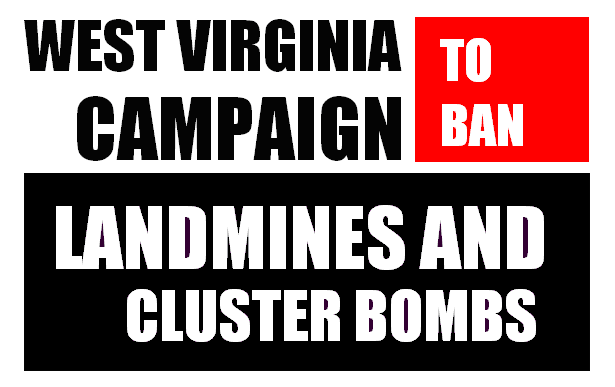The Mine Ban
Treaty’s Third Review Conference (3RC), will take place from 23 to 27 June in 2014 in Maputo, Mozambique. It will mark a critical moment in the Treaty’s history, taking place 15 years after the Treaty’s entry into force and the First Meeting of States Parties in 1999, which was also held in Maputo. The Review Conference will assess the progress made to date and provide a roadmap for the work ahead. Inspired by Mozambique’s example of how a heavily mine-affected country has effectively tackled its landmine contamination and is expected to complete its mine clearance in 2014, the ICBL sees completion as the most appropriate theme for the period in the lead-up to, during, and beyond the Review Conference. The WEST VIRGINIA CAMPAIGN TO BAN LANDMINES is calling on the Obama Administration to bring the United States on board the Mine Ban Treaty. This review is a perfect opportunity for the U.S. to join the treaty.
MINE BAN TREATY VIDEO:
The Completion Challenge: Commit to Complete!
The ICBL/WVCBL is calling on the mine ban community to take up the Completion Challenge – to ensure that the work started several years ago is actually completed as soon as possible, and no later than 10 years after the Third Review Conference. We strongly believe that with renewed determination, sufficient resources and the use of good practices, all current States Parties can complete their major Mine Ban Treaty obligations within 10 years of the Third Review Conference.
The Third Review Conference in Maputo should therefore be seen as the starting point of a Countdown to Completion of the Mine Ban Treaty’s primary obligations and should be accompanied by a genuine re-commitment of efforts and resources by the international community in order to meet this challenge. By the end of the 10-year Countdown to Completion we expect to also celebrate having no new landmine victims in States Parties.
We are therefore throwing this Completion Challenge at all states – to come to Maputo with a clear commitment to complete their remaining specific treaty obligations (such as clearance, victim assistance, stockpile destruction, or joining the treaty) within a clearly defined, ambitious deadline, and to make a public commitment at the Maputo Conference to meet this goal.
Statement of Senator Patrick Leahy
Time To Change our Policy on Anti-Personnel Landmines
Senate Floor
March 27, 2014
Mr. LEAHY. Mr. President, over the past 20 years I have spoken many times about the toll inflicted on innocent civilians and U.S. soldiers from anti-personnel landmines.
Like booby traps, they are inherently indiscriminate, triggered by whoever comes into contact with them. 161 nations, including most of our allies and friends, have signed a treaty banning them. The United States is conspicuously not among them.
In 1994 – twenty years ago – in a speech to the UN General Assembly, President Bill Clinton called for the elimination of anti-personnel landmines.
Two years later, in 1996, President Clinton said this: “Today I am launching an international effort to ban anti-personnel land mines.” He went on to announce a U.S. plan to develop alternatives to landmines, with the goal that the United States would end its use of anti-personnel mines by 2006.
In 1997, the United States missed an opportunity to be a leader in the international effort to ban anti-personnel mines by refusing to sign the Mine Ban Treaty.
2006 came and went. President Clinton’s administration ended. After eight years of President George W. Bush, President Obama was elected and then reelected. In the meantime, U.S. troops fought two long ground wars without using anti-personnel landmines.
In 2010, I and 67 other United States Senators – Democrats and Republicans – sent a letter to President Obama. We commended him for agreeing to review the U.S. Government’s policy on anti-personnel mines, and we urged him to conform U.S. policy to the Mine Ban Treaty as a first step.
Almost five years since the start of that review, we are still waiting for the results.
After 20 years and three U.S. presidents, there is no evidence the United States is any closer to joining the treaty than when President Clinton made that speech. It is very disheartening.
The Pentagon has long argued that it needs landmines to defend South Korea. In 1996, then Secretary of Defense William Perry said the Pentagon would, quote, “move vigorously” to achieve alternative ways to prevent a North Korean attack so they would no longer need landmines.
Yet, after 20 years, there is no evidence they have done anything to revise their Korea war plans without anti-personnel mines, or that any President has ever told them to.
Some have asked what difference it would make if the U.S. joins the Mine Ban Treaty. We have not used anti-personnel mines for 23 years and we do far more to support humanitarian demining than any other country.
We have not exported anti-personnel mines since my amendment became law in 1992. We have spent many tens of millions of dollars through the Leahy War Victim’s Fund to aid those injured by mines.
If we are not causing the problem, why bother?
Because anti-personnel landmines continue to kill and cripple innocent people.
Because indiscriminate, victim-activated weapons have no place in the arsenal of a civilized country.
Because there is a treaty banning these weapons that countries as diverse as Afghanistan to Great Britain have signed.
And because the United States has by far the most powerful military in the world and this treaty needs the United States.
As President Obama said in his acceptance speech for the Nobel Peace Prize: “I am convinced that adhering to standards, international standards, strengthens those who do, and isolates and weakens those who don’t.”
Twenty years after President Clinton’s UN speech, President Obama can give real meaning to those words by putting the United States on a path to join the treaty.
That means destroying what remains of our stockpile of mines. It means revising our Korea war plans to get rid of anti-personnel mines.
President Obama is the only one who can make that happen, and time is running out.


